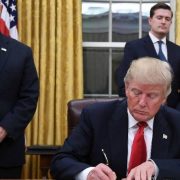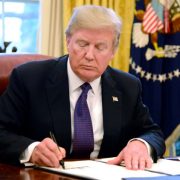Self-reliance is a behavioral attribute of great power. Self-reliant individuals are entrepreneurs who know and understand themselves well, are objective in calculating how to serve others best in the economic marketplace in order to thrive, and they assemble the right bundle of resources, including education and skills, to support their individual mission. They know how to collaborate and are thoughtful in joining or assembling teams and common interest groups in the pursuit of shared success, based on shared values. They are entrepreneurs in the broadest sense of the term, imagining a future that can be better for themselves and their collaborators, partners and customers, and working together to bring that future about. When it’s time to change the team or the terms of collaboration, because conditions in the market have changed, self-reliant people are agile in making adjustments.
What if there were a foreign policy strategy like this for the USA? President Trump is designing one.
Yoram Hazony and Ofir Haivry, writing in The Wall Street Journal, describe the new, smarter strategy. First, any entrepreneur starts with an understanding of the problem that is crying out for a solution:
On paper, America has defense alliances with dozens of countries. But these are the ghosts of a rivalry with the Soviet Union that ended three decades ago, or the result of often reckless policies adopted after 9/11.
Asking the entrepreneur’s question – why? – the authors identify the problem in the shape of costs that are not shared, indicative of values that are not shared.
Today a $22 trillion national debt and the voting public’s indifference to the dreams of world-wide liberal empire have depleted Washington’s ability to wage pricey foreign wars. At a time of escalating troubles at home, America’s estimated 800 overseas bases in 80 countries are coming to look like a bizarre misallocation of resources.
……the U.S. can no longer afford to assume responsibility for defending entire regions if the people living in them aren’t willing and able to build up their own credible military deterrent.
……so-called allies include Turkey and Pakistan, which share neither America’s values nor its interests, and cooperate with the U.S. only when it serves their purposes. Other “allies” refuse to develop a significant capacity for self-defense, and are thus more accurately regarded as American dependencies or protectorates.
The USA’s so-called allies also include the European countries in NATO who refuse to spend adequate amounts on their own defense, and, operating under the US defense umbrella, divert spending to the welfare and dependency programs that have resulted in decivilization and cultural decadence. Worse, their decadent ideas float over the Atlantic to pollute America shores.
These ideas are then exported to the U.S. and the rest of the democratic world via international bodies, universities, nongovernmental organizations, multinational corporations and other channels. Having subsidized the creation of a dependent socialist paradise in Europe, the U.S. now has to watch as the EU’s influence washes over America and other nations.
How would the entrepreneurial approach to a foreign policy of collaborative self-reliance evolve? The authors build it brick-by-brick.
The first brick in the wall is to separate the Eastern European nations with a genuine self-interest in deterring Russia from those Western Europeans who, without borders with Russia, have no real skin in the game.
The members of the Visegrád Group—the Czech Republic, Hungary, Poland and Slovakia—have a combined population of 64 million and a 2017 GDP of $2 trillion (about 50% of Russia’s, according to CIA estimates). The principal strategic question is therefore whether these countries are willing to do what is necessary to maintain their own national independence. If they are—at a cost that could well exceed the 2% figure devised by NATO planners—then they could eventually shed their dependent status and come to the table as allies of the kind the U.S. could actually use: strong frontline partners in deterring Russian expansion.
The second brick comes from an examination of shared national interests in repelling the economic and military aggression of the Chinese Empire.
Perhaps the most important candidate for such a strategic alliance is India. Long a dormant power afflicted by poverty, socialism and an ideology of “nonalignment,” India has become one of the world’s largest and fastest-expanding economies. In contrast to the political oppression of the Chinese communist model, India has succeeded in retaining much of its religious conservatism while becoming an open and diverse country—by far the world’s most populous democracy—with a solid parliamentary system at both the federal and state levels.
India’s values, interests and growing wealth could establish an Indo-American alliance as the central pillar of a new alignment of democratic nation states in Asia, including a strengthened Japan and Australia.
A third brick might come from the United Kingdom, if they can extricate themselves from their EU nightmare.
With a population of more than 65 million and a GDP of $3 trillion (75% of Russia’s), the U.K. may yet become a principal partner in a leaner but more effective security architecture for the democratic world.
Adding a few more bricks, like Israel, Japan and Australia, the authors assemble their collaborative alliance of self-reliant nations.
An alliance including the U.S., the U.K. and the frontline Eastern European nations, as well as India, Israel, Japan and Australia, among others, would be strong enough to exert sustained pressure on China, Russia and hostile Islamist groups.
President Trump is often accused of creating a needless rift with America’s European allies. Establishment neo-conservatives portray him as an incompetent bull in their carefully curated china shop. But by assembling an alliance of self-reliant democratic nations, the President could reduce America’s security burden, close a lot of our overseas military bases, and make military intervention the exception rather than the rule.
At the same time, it would free American resources for the long struggle to deny China technological superiority, as well as for unforeseen emergencies that are certain to arise.
Self-reliance works not only for people, but also for nations.
Mr. Hazony is the author of “The Virtue of Nationalism.” Mr. Haivry is vice president of the Herzl Institute in Jerusalem. The referenced article appeared in the April 6, 2019, print edition of WSJ.
Follow Hunter Hastings at hunterhastings.com













